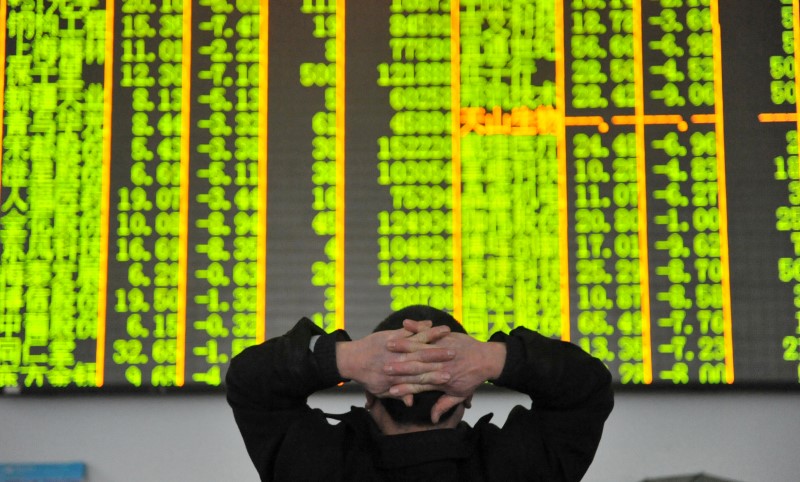By Luoyan Liu and John Ruwitch
SHANGHAI (Reuters) - Chinese stocks on Monday handed back their gains from a bounce late last week as worries mount ahead of a U.S. move to impose $34 billion of tariffs on Chinese exports.
The yuan
Chinese 10-year treasury futures for September
After rising last week to a more than one-year high on trade war fears, the cost to insure exposure to Chinese debt fell on Monday. The spread of the five-year credit default swap rate on Chinese sovereign debt
Markets are jittery ahead of a July 6 deadline when the United States is due to impose the tariffs on Chinese exports. Beijing is expected to respond with tariffs of its own on U.S. goods.
Even before the tariffs kick in, a private survey showed manufacturing activity in the world's second-largest economy slowed slightly.
China's Caixin/Markit Manufacturing Purchasing Managers' index (PMI) declined to 51.0 in June from May's 51.1, with a subindex showing new export orders contracting for the third straight month and the most in two years.
On Friday, Chinese stocks and the yuan bounced with benchmark share indexes having one of their best days since mid-2016.
Still, June represented the worst month for Chinese stocks in more than two years and the yuan's biggest monthly fall on record.
By 0637 GMT on Monday, the blue chip CSI300 index (CSI300) was down 3.1 percent, while the Shanghai Composite Index (SSEC) fell about 2.6 percent. Financial stocks led declines, with the CSI financial sub-index <.CSI300FS> off 4 percent.
Chen Xiaopeng, an analyst with Sealand Securities, said more pessimism was on the cards for Chinese stock investors with the country's economic outlook hurt by prospects of a full-blown trade war between Beijing and Washington.
"It could take at least several months for the major stock indexes to bottom out," he said.
Uncertainties will reinforce investors' inclination to "huddle together for warmth" in outperforming sectors such as consumers and healthcare, Chen said.
An index tracking healthcare firms <.CSI300HC> is up nearly 20 percent so far this year, while the Shanghai index is down around 15 percent.
Concerns about the world's second-largest economy heightened following more signs of slowdown in the manufacturing sector.
Hong Kong's markets were closed on Monday for a public holiday to mark the 21st anniversary of the former British colony's return to Chinese rule.
The yuan fell 3.25 percent against the dollar in June and continued its slide despite a firmer-than-expected midpoint set by the central bank on Monday.
"Investors don't care and spot yuan rates continued weakening," a trader said.
If the yuan's decline intensifies, Morgan Stanley (NYSE:MS) economists wrote in a note on Monday that the Chinese central bank, the People's Bank of China, may step up intervention.
"CNY may overshoot with shifting market expectations of policy stance amid higher trade tensions, but we don't expect policymakers to encourage material RMB depreciation. The PBOC could step up intervention if depreciation risk intensifies," they wrote.
On Friday, the last trading day of the month, ING lowered its yuan forecast to 7 per dollar by the end of the year from a previous forecast of 6.6, citing risks to the policy outlook.
"A weaker currency would, at most, be a shield, safeguarding wider damage from a trade war and the hurdles faced by Chinese companies' operating in the U.S.," it said. ING added it did not see any panic in the market.
ING's shift follows a similar move on June 24 by Deutsche Bank (DE:DBKGn), which said it expected the yuan to depreciate to 6.8 per dollar by the end of this year and 7.2 by the end of 2019. It had previously forecast 6.4 yuan per dollar in each year.
The depreciation will be "driven by an important change of policy stance from tightening to loosening", it said.
(This version of the story was refiled to correct typo in headline)
